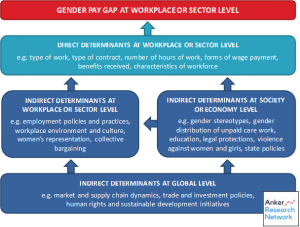Covid-19 – a step back for gender equality
Inequality between women and men is among the most pervasive forms of inequality globally, and the Covid-19 pandemic has made it worse. Although mortality rates are higher for men, women are more likely to be Covid-19 long-haulers and they are bearing the brunt of the social and economic fallout, including increased violence within their homes and a higher risk of unwanted pregnancy and child marriage. In particular, the pandemic has deepened gender inequalities in income and employment. The latest estimates indicate that women make up 39 percent of global employment but account for 54 of overall job losses. Women are not only overrepresented in hard-hit sectors such as retail, food services, tourism and light manufacturing, they are also more likely than men to be in informal employment and therefore excluded from many government measures to protect jobs and incomes. Added to this, the increase in unpaid care work (childcare, cooking, cleaning, etc.) arising from the closure of schools, nurseries and workplaces has fallen mainly on the shoulders of women and girls, driving some women out of paid employment altogether and reducing the income of others.
Growing calls for more gender-equitable economies
The disproportionate impact of the pandemic on women has led to calls from the UN, European Parliament and others to ensure “building back better” includes more gender-equitable and inclusive economies. It adds to the momentum that has built up around SDG 5 (gender equality and women’s empowerment) and pressure on policymakers and businesses to do more to ensure women can participate in the global economy on equal terms with men. This includes taking steps to address gender inequalities in access to jobs, training, productive resources, business services and markets, as well as ensuring that women workers are given the same rights and opportunities as male workers, are paid equally, and are protected from harassment and other forms of violence linked to their work. It also means challenging gender stereotypes and social norms around women’s and men’s work, adopting family-friendly employment policies and practices, and investing in social services and infrastructure.
Can voluntary sustainability standards help deliver on this ambition for gender-equitable economies?
This was the central question posed in a paper I wrote for the UK’s Trade and Investment Advocacy Fund (TAF2+). The paper brings an historical perspective to this question, looking at the evolution of voluntary standards for trade over the last three decades and recent developments such as human rights diligence legislation and more open acknowledgement of the tensions between buyers’ requirements for social and environmental protections at supplier level and their purchasing practices. The available evidence – albeit relatively limited – suggests that voluntary standards have, overall, had minimal impact on gender inequality and may even have inadvertently reinforced men’s privileged position in households, workplaces and producer organizations. This reflects the fact that most scheme owners (corporate and non-profit) have until recently paid scant attention to gender issues in global supply chains, other than to have a general clause on non-discrimination and occasionally engage in projects with some kind of gender focus.
However, a small number of standards organizations and businesses have begun taking a more strategic and comprehensive approach, such as developing specific objectives and clauses on gender and tackling issues such as land rights, maternity rights, women’s representation and gender-based violence. Wider trends towards greater collaboration, transparency and accountability in market-based sustainability initiatives, including standards systems, also bode well. Nevertheless, there are still major obstacles to overcome, including inadequate incentives and rewards for businesses that demonstrate high standards – from consumers, onward buyers, investors and states – and a lack of sanctions for those that behave irresponsibly.
It is also important to recognize that standards alone cannot be expected to deal with all the causes of gender inequality, which are rooted in societal structures and relationships that go beyond supply chains and markets. Given this, a key contribution of voluntary sustainability standards may be establishing criteria and norms for a gender-equitable and inclusive environment for workers and producers in global supply chains, and providing hard evidence and data on the systemic issues that need to be addressed by states, businesses and civil society.
Meeting the need for more detailed information on gender issues in global supply chains
One step in this direction has been taken by the Anker Living Wage and Income Research Network, which is linked to the Global Living Wage Coalition. Over the last year, Richard Anker, Martha Anker and I have developed a framework and guidelines for measuring gender differences in wages in specific sectors and workplaces, with financial support from Fairtrade International. While data on gender pay gaps at global and country levels are relatively common, there is little analysis of gender pay gaps in global supply chains, and until now, no guidance available on how to go about doing this analysis. The aim is to fill this lacuna and provide robust, credible information on the size of gender pay gaps and, more importantly, the direct and indirect causes of those gaps (see Figure 1). This information can then be used by employers, workers, trade unions, women’s rights organizations, governments, buying companies, standards organizations and others to identify appropriate policies and interventions to close the gender pay gap as well as gaps to a living wage. It will also serve as a baseline for assessing the effectiveness of actions to reduce the gender pay gap.
Figure 1: Simplified framework for measuring and understanding gender pay gaps in specific sectors and workplaces

Learning, collaboration, scaling up
As the world emerges from the Covid-19 crisis and enters a long period of recovery, it is critical to keep at the front of minds the lessons that the pandemic has taught us about gender inequality and vulnerability. Voluntary sustainability standards could be an important tool for promoting minimum rights and protections for all workers and producers, including living wages and living incomes, and for galvanizing action to address the root causes of women’s disadvantaged position in the global economy. For that to happen, standards organizations and the business community need to invest in learning and engage more extensively with women’s rights organizations, trade unions and governments in supplier countries, so that pockets of good practice expand to become the norm.
Note: The Anker Living Wage and Income Research Network is currently looking for opportunities to test the guidelines for measuring gender pay gaps in a range of sectors and locations. For more information, please contact Sally Smith ([email protected]).
